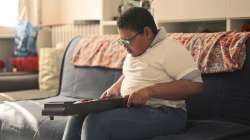Early treatment during childhood may help curb obesity, finds study
The findings showed that the children in all three groups improved their weight status and saw a reduction in their degree of obesity but the children whose parents received parental support had the best results, especially those who also received follow-up phone calls.

Childhood obesity is an increasing health problem across the world, affecting both developed and developing countries. It is characterized by an excessive accumulation of body fat which increases the likelihood of health risks, such as heart disease, type 2 diabetes, high blood pressure, and certain forms of cancer. The causes of childhood obesity are complex and multifactorial, involving environmental, social, and physiological factors including genetics, diet, exercise, sedentary behaviour, sleep patterns, and the availability of unhealthy food. Health professionals recommend a balanced diet and regular physical activity to prevent or treat childhood obesity. Family members and caregivers can help children develop healthy eating habits and physical activity habits at a young age to reduce the risk of obesity in the future.
However, according to the study published in the International Journal of Obesity, early treatment of obesity in childhood is effective in both the long and short term. The study was conducted on 170 children of age between four and six years old along with their parents.
Children and parents were randomly assigned to three treatment conditions: standard treatment, parental support group, or parental support group with follow-up telephone support.
Participants in the standard treatment group had meetings focusing on diet and exercise with a doctor or dietician. The other two parental support groups did not involve the children and focused on how the parents could promote healthy lifestyles in the family positively.
"Such conversations can centre on how to set boundaries, how to teach children new behaviours and how to communicate with preschools, grandmothers, neighbours and other adults in the children's world," said principal investigator Paulina Nowicka, Associate Professor in Pediatric Science at the Department of Clinical Science, Intervention and Technology, Karolinska Institutet in Sweden.
The findings showed that the children in all three groups improved their weight status and saw a reduction in their degree of obesity but the children whose parents received parental support had the best results, especially those who also received follow-up phone calls.
The team also found that more children in the third group showed a clinically relevant improvement of their weight status associated with better metabolic health, by which I mean better levels of blood lipids and glucose, said Nowicka.
Along with this, the scientists also suggested parents build a clear structure at home regarding lunch and do things like strengthen family bonds, make the child involved in the cooking etc.
"Treating children at that age is much more effective than if you start treating them in their teens. some adolescents are looking at possible bariatric surgery and we hope that this can be avoided with earlier treatment," Nowicka said.
(With IANS Inputs)